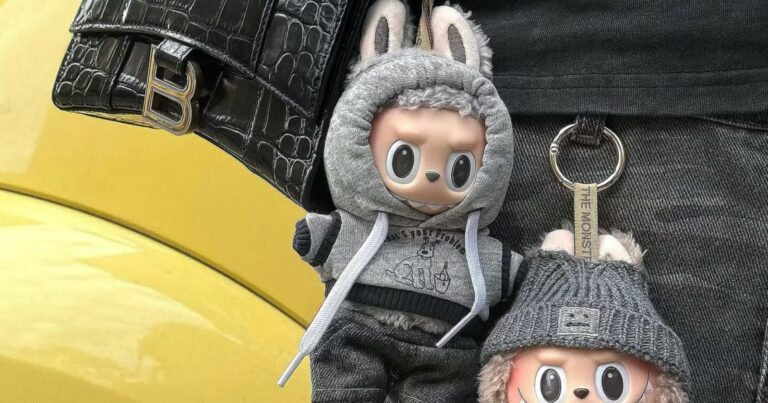The counterfeit market has also reached the collectible most loved by fashion insiders: Labubu. These figurines, born from the imagination of Hong Kong artist Kasing Lung and distributed by the Chinese toy giant Pop Mart, have now surpassed the threshold of hype. Today, they are no longer simple toys, but cult accessories, display pieces, and symbols of status and style. The latest collaboration between the little monster, the Japanese brand Sacai, and the Korean band Seventeen, auctioned off for over $31,000, confirmed how firmly Labubu has entered the realm of luxury collectibles. In Milan, queues outside the Pop Mart flagship store in Porta Venezia became so intense that they required the presence of law enforcement to maintain public order; according to some online users, it even escalated into scenes of panic. It’s hardly surprising, considering that Labubu figures today are not only hard to find, but increasingly unaffordable. Given the surging demand and limited releases, the secondhand market has seen prices skyrocket, with some figures easily surpassing $1,500. On Vinted, a plush from the “Dress Be Latte” collection was listed for €2,549. As often happens in the luxury world, perceived scarcity drives desire, and like a domino effect, inevitably leads to the fake market. In recent months, as also reported by Dao Insights, the number of counterfeit Labubu in circulation has skyrocketed.
These are not just cheap knock-offs found at markets—there is now a growing market for 1:1 superfakes, with replicas nearly indistinguishable from the originals, complete with seemingly authentic Pop Mart labels. Some sellers even claim to have obtained real models to mold their copies. These “homeland” versions are the most sought-after by those unable to get their hands on the official 3.0 release, and are sold for around 430 RMB (nearly $60) for a set of six, very close to the 594 RMB official pricing. On the other hand, there are the “shanzhai” counterfeits, modified-design versions often featuring slight name or detail changes to avoid copyright issues. In these cases, Labubu is renamed “Lafufu”, and the price drops to about 190 RMB for six figures in the cheapest version, or 360 RMB for higher-quality ones. On social media—especially TikTok—netizens ironically compare the originals to the Lafufu versions, as the counterfeit models often feature strong deformities, making the figures appear even more “monster-like.”
As Dao Insights highlights, fakes are easily found in wholesale markets, though they are increasingly going underground due to recent government inspections. Some journalists visited clandestine factories with five production lines running three shifts a day. Another dealer stated that no one is allowed to enter the factories and that shipments are handled with a level of secrecy comparable to drug trafficking. Only trusted clients are granted access to the warehouses in Yiwu, Zhejiang province. Many suspect that these operations are tied to the same OEM (Original Equipment Manufacturer) factories that officially produce for Pop Mart. A scenario that became a key talking point in the luxury world in the first half of the year, following the scandal of the “Chinese manufacturers”.
Meanwhile, further proof that Labubu figures are now seen as semi-luxury items comes from the world of authentication. The platform CheckCheck announced in 2024 that it is the first U.S.-based company to offer authentication services for Labubu. A move that speaks volumes about the positioning of these objects in today’s global market: no longer just collectible toys, but on-trend accessories, often spotted clipped to designer bags, or even appearing on stadium stages and red carpets. In China, the Labubu craze has gone so far as to spawn rental services for the dolls, with users willing to pay just to showcase a rare piece at events or photo shoots. It’s yet another sign that modern collecting operates under dynamics similar to the fashion system, made up of hype, scarcity, status symbols, and inevitably, fakes. It seems the parallel no longer scares anyone, even as the Labubu obsession becomes increasingly unhinged.


